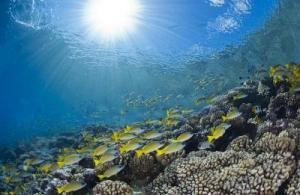
In a new article in Nature Climate Change scientists from NOAA’s Cooperative Institute for Marine and Atmospheric Studies show maps that illustrate how rising sea temperatures are likely to affect all coral reefs, including those in Polynesia, in the form of annual coral bleaching events under various different emission scenarios. Their results emphasize that without significant reductions in emissions most coral reefs on the planet are at risk for bleaching within the next several decades. Credit: Thomas Vignaud
Many coastal areas who have or once had pristine coral reefs, rely on ecotourism for part of their income. But, once the reefs start to die out, the fish move away and the once sought-after snorkeling spot becomes a skeletal reef for the history books.
Coral reefs aren’t only beneficial economically, they also act as important carbon sinks, and homes and food for marine life. Their value cannot be measured with a price tag since they are a crucial part of the Earth’s ecosystem.
A study published today in Nature Climate Change by University of Miami Rosenstiel School of Marine & Atmospheric Science scientists shows how different levels of carbon emissions can cause coral bleaching. The study used recent data from the Fifth Assessment Report of the Intergovernmental Panel on Climate Change (IPCC) to create climate models. Although some types of coral bleaching can be a localized seasonal event, coral bleaching in mass quantities is caused by water temperatures that are too warm. This is because the algae, or zooxanthellae, that live inside the coral skeleton and give it its color cannot tolerate the temperatures and become expelled from the coral. If too many zooxanthellae become expelled, the corals become malnourished and die. Continue reading
